#harrison david rivers
Explore tagged Tumblr posts
Text


Talking Heads - More Songs About Buildings and Food (1978)
Forty-six years ago today, on July 14, 1978, Talking Heads released their second studio album, More Songs About Buildings and Food. A critical and financial success, More Songs brought the band to a new level. Peaking at #29 on the Billboard chart and the UK album chart at #21, the album had an ideal producer in Brian Eno, who would go on to produce two more albums by the band. The lone single from the album was also its only cover—Al Green’s “Take Me to the River”—that reached #26 in the US.
#talking heads#music#video#take me to the river#david byrne#tina weymouth#chris frantz#jerry harrison#more songs about buildings and food#anniversaries
15 notes
·
View notes
Text
25 animatics 2 and a half years 1 hour, 20 minutes and 39 seconds Approximately 5852 frames 349 unique characters appearing a total of 982 times
have what will most likely be my final blaseball animatic, a self-indulgent goodbye to all my beloved beams and a whole bunch of other players
Music is Celebrate the Reckless by Magic Giant - design credits below the cut
Credits: Randall Marijuana by alienmandy_ - Pangolin Ruiz by Mortimer_Mekhane - Dunn Keyes, Ramirez Winters and Pedro Davids by glassgoblin - Cory Ross and Grollis Zephyr by saltbuzzard - Lucas Petty by Dorito - Logan Rodriguez by Monthenor - Zephyr McCloud by dreambaot - Steals Mondegreen by 510five - Spears Taylor by Bells - Jessica Telephone by telekeys - Randy Dennis and Niq Nyong'o by tiny_revel - Kelvin Drumsolo by Australia-Hungary#9082 - Haruta Byrd and Erin Jesaulenko by miasmajesties - Justice Spoon and Edric Tosser by necromngo - Isaac Johnson, Gita Sparrow, Dunlap Figueroa and Mullen Peterson by _waalkr - Rivers Javier by toadparty and sidoopa - Baby Sliders by samiratu - Alvie Kesh by quilyn - Alexander Horne and Wyatt Mason VI by Fancymancer - Forrest Bookbaby by bugsbenedict - Helga Burton and Helga Moreno by electricgaunt using picrew by r4tist - Andrew Solis by rabbittraps_ - Rhys Trombone by Ephesos - Esme Ramsey by HetreaSky and grr - Mickey Woods by sol - Bright Zimmerman by staradavid - Iggy Delacruz by Karagna_ - Rey Wooten by dipppitydoop - Ziwa Mueller and Richmond Harrison by avery_helm - Workman Gloom and Beasley Gloom by shenaniglenn - Snyder Briggs by mensisritual - Jasmine Washington, Donia Bailey, Jasper Blather and Hops Chen by desmodusrotunds - Avila Guzman by jaungeedraws - Richardson Games and Hiroto Wilcox by CurseOfScots - Cornelius Games by kyl_armstrong - Nicholas Vincent by Hazel Cooper - Eugenia Bickle by awhekate - Fran Beans by thr33h3addrag - Valentine Games by deerstained - Magi Ruiz by Nofacenerd - Tiana Takahashi by VHS_DREAMER - Tillman Henderson by cryptmilk - Mcdowell Karim by ferretrix - Sebastian Woodman by Starfauna - Yosh Carptener by gfclass - Aldon Cashmoney by occultclassic - Donia Bailey and Hiroto Wilcox by crickadelic - Jasper Blather by nel using picrew from astrolava
Wiki Pages: Eugenia Garbage - Rivers Rosa - Stevenson Heat - Qais Dogwalker - Margarito Nava - Lou Roseheart - Beck Whitney - Nic Winkler - Neerie McCloud - Blood Hamburger - Kennedy Rodgers - Nagomi Meng - Lachlan Shelton - Kichiro Guerra - Fletcher Yamamoto
Other: Emmett Internet - Priya Fox - London Simmons - Cravel Gesundheit - Willow Dice - Xanthe - Jorge Owens - Carter Grimsley - Kajjala Aliyev - Guozhi Ong - Grizz El Sayed - Thomas Marsh - Amos Parveen - Kaj Statter Jr. - Anastasia Isarobot - Zack Sanders - Özlem Suttner - Malik Romayne - Sigmund Castillo - Son Jensen - Jayden Wright - Paula Reddick - Sandoval Crossing - Velasquez Meadows - Hahn Fox - Howell Franklin - Miguel James - Passenger - Nagomi Nava - Wyatt Mason VII - Wyatt Mason III - Wyatt Mason V - Dudley Mueller - Joe Voorhees - Harriet Gildehaus - Phineas Wormthrice - Elvis Figueroa - Borg Ruiz - Tot Best - Lars Taylor - Nerd Pacheco - Hendricks Richardson - Kaz Fiasco - Hank Marshallow - Beans McBlase - Sutton Bishop - Quack Enjoyable - Guy Gulp - Siobhan Chark - Alaynabella Hollywood
Unsure: Mooney Doctor - Wyatt Mason IV
#blaseball#my art#moab hellmouth sunbeams#animatic#SO LONG MY BABIES#I LOVE YOU I WILL MISS YOU FOREVER#IM GIVING U ALL A HAPPY ENDING BECAUSE IM ACTUALLY A SAP
154 notes
·
View notes
Text

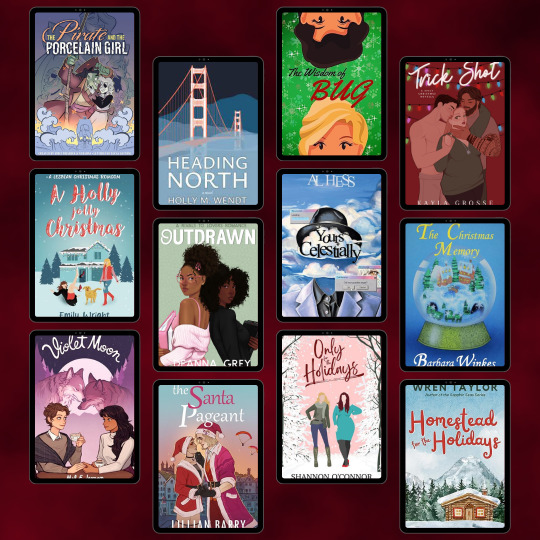




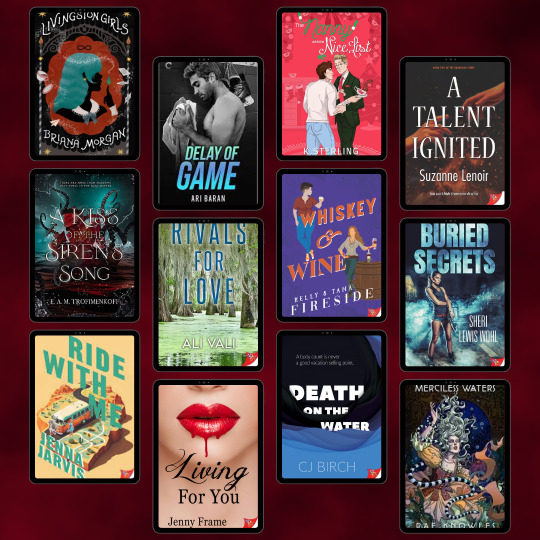

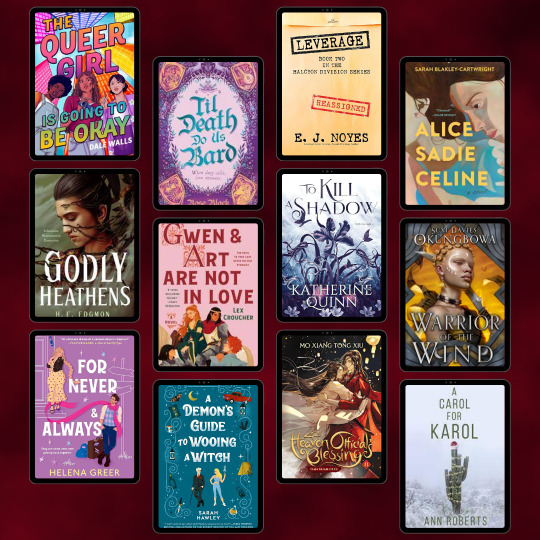
Queer Books November 2023
🌈 Good afternoon, my bookish bats! Struggling to keep up with all the amazing queer books coming out this month? Here are a FEW of the stunning, diverse queer books you can add to your TBR before the year is over. Remember to #readqueerallyear! Happy reading!
❤️ The Pirate and the Porcelain Girl by Emily Riesbeck 🧡 Heading North by Holly M. Wendt 💛 The Wisdom of Bug by Alyson Root 💚 Trick Shot by Kayla Grosse 💙 A Holly Jolly Christmas by Emily Wright 💜 Outdrawn by Deanna Grey ❤️ Yours Celestially by Al Hess 🧡 The Christmas Memory by Barbara Winkes 💛 Violet Moon by Mel E. Lemon 💙 The Santa Pageant by Lillian Barry 💜 Only for the Holidays by Shannon O’Connor 🌈 Homestead for the Holidays by Wren Taylor
❤️ You Can Count on Me by Fae Quin 🧡 No One Left But You by Tash McAdam 💛 The Worst Thing of All is the Light by José Luis Serrano, Lawrence Schimel 💚 Today Tonight Forever by Madeline Kay Sneed 💙 Wren Martin Ruins It All by Amanda DeWitt 💜 Emmett by L. C. Rosen ❤️ Finding My Elf by David Valdes 🧡 Tonight, I Burn by Katharine J. Adams 💛 Gorgeous Gruesome Faces by Linda Cheng 💙 Bookshops & Bonedust by Travis Baldree 💜 A Power Unbound by Freya Marske 🌈 We Are the Crisis by Cadwell Turnbull
❤️ The Manor House Governess by C.A. Castle 🧡 You Owe Me One, Universe by Chad Lucas 💛 Last Night at the Hollywood Canteen by Sarah James 💚 Skip!: A Graphic Novel by Rebecca Burgess 💙 Something About Her by Clementine Taylor 💜 Touching the Art by Mattilda Bernstein Sycamore ❤️ A Nearby Country Called Love by Salar Abdoh 🧡 Normporn: Queer Viewers and the TV That Soothes Us by Karen Tongson 💛 Sir Callie and the Dragon’s Roost by Esme Symes-Smith 💙 The Order of the Banshee by Robyn Singer 💜 Once Upon My Dads’ Divorce by Seamus Kirst, Noémie Gionet Landry 🌈 Forsooth by Jimmy Matejek-Morris
❤️ A Common Bond by T.M. Kuta 🧡 Risk the Fall by Riley Hart 💛 Just a Little Snack by Yah-Yah Scholfield 💚 Home for the Holidays by Erin Zak 💙 NeurodiVeRse by MJ James 💜 Dark Heir (Dark Rise #2) by C.S. Pacat ❤️ sub/Dom by Rab Green 🧡 Bitten by the Bond by Elaine White 💛 Heir to Frost and Storm by Ben Alderson 💙 The Sea of Stars by Gwenhyver 💜 Bad Beat by L.M. Bennett 🌈 Idol Moves by K.T. Salvo
❤️ Plot Twist by Erin La Rosa 🧡 In the Pines by Mariah Stillbrook 💛 The Crimson Fortress (The Ivory Key #2) by Akshaya Raman 💚 Only She Came Back by Margot Harrison 💙 Megumi & Tsugumi, Vol. 4 by Mitsuru Si 💜 Pritty by Keith F. Miller Jr. ❤️ Just Lizzie by Karen Wilfrid 🧡 An Atlas to Forever by Krystina Rivers 💛 Come Find Me in the Midnight Sun by Bailey Bridgewater 💙 Bait and Witch by Clifford Mae Henderson 💜 Shadow Baron by Davinia Evans 🌈 Day by Michael Cunningham
❤️ Livingston Girls by Briana Morgan 🧡 Delay of the Game by Ari Baran 💛 The Nanny with the Nice List by K. Sterling 💚 A Talent Ignited by Suzanne Lenoir 💙 A Kiss of the Siren’s Song by E.A.M. Trofimenkoff 💜 Rivals for Love by Ali Vali ❤️ Whiskey & Wine by Kelly Fireside, Tana Fireside 🧡 Buried Secrets by Sheri Lewis Wohl 💛 Ride with Me by Jenna Jarvis 💙 Living for You by Jenny Frame 💜 Death on the Water by CJ Birch 🌈 Merciless Waters by Rae Knowles
❤️ Vicarious by Chloe Spencer 🧡 Sapling’s Depths by Spencer Rose 💛 That French Summer by Sienna Waters 💚 System Overload by Saxon James 💙 King of Death by Lily Mayne 💜 Warts and All by Ashley Bennett ❤️ Principle Decisions by Thea Belmont 🧡 The Best Mistake by Emily O’Beirne 💛 Sugar and Ice by Eule Grey 💙 Until The Blood Runs Dry by MC Johnson 💜 Splinter : A Diverse Sleepy Hollow Retelling by Jasper Hyde 🌈 The Mischievous Letters of the Marquise de Q by Felicia Davin
❤️ The Queer Girl is Going to be Okay by Dale Walls 🧡 Til Death Do Us Bard by Rose Black 💛 Leverage by E.J. Noyes 💚 Alice Sadie Celine by Sarah Blakley-Cartwright 💙 Godly Heathens by H.E. Edgmon 💜 Gwen & Art Are Not in Love by Lex Croucher ❤️ To Kill a Shadow by Katherine Quinn 🧡 Warrior of the Wind by Suyi Davies Okungbowa 💛 For Never & Always by Helena Greer 💙 A Demon’s Guide to Wooing a Witch by Sally Hawley 💜 Heaven Official’s Blessing: Tian Guan Ci Fu Vol. 8 by Mò Xiāng Tóng Xiù 🌈 A Carol for Karol by Ann Roberts
#book release#queer fiction#queer romance#queer books#queer#books#books to read#queer book recs#book recs#batty about books#battyaboutbooks
70 notes
·
View notes
Text
A Deadly "Peacemaker" and Unlikely Matchmaker: The Worst First Date Ever.
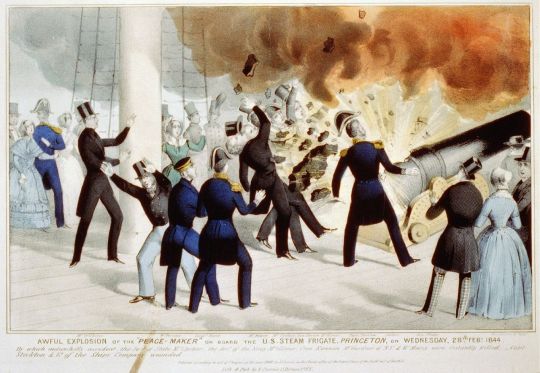
On February 28, 1844, Dolley Madison was far removed from her time as First Lady of the United States, but still held on to her spot as Washington's Greatest Hostess. She was the widow of a bona fide Founding Father, James Madison -- the 4th President of the United States and principal author of the U.S. Constitution and Bill of Rights -- but he had left the White House almost 27 years earlier and died in 1836. However, Dolley -- now 75 years old -- remained a darling of the Washington social scene. Though she often struggled financially, Dolley Madison continued entertaining guests in the nation's capital and helped organize social gatherings around the city, acting as a sort of guest hostess wherever she visited and whenever she was invited -- and she was invited everywhere. Now, as the first auguries of spring began their awakening in-and-around Washington, D.C., Dolley helped plan a cruise down the Potomac River on the newly-built USS Princeton -- a showcase vessel for the United States Navy which happened to be one of the most advanced warships of its time. Nearly 70 years after the Declaration of Independence, Dolley Madison was still the life of the party and an ideal person to help plan a celebration aboard the USS Princeton, just as she'd been doing throughout the entire life of the young American nation.
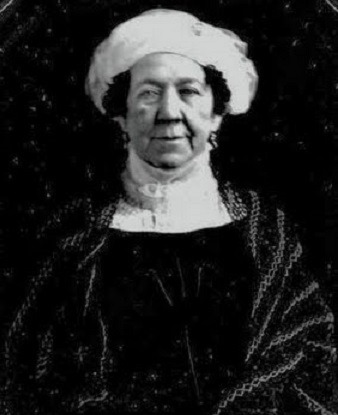
[Dolley Madison, daguerreotype by Mathew Brady in 1848, four years after the Princeton explosion.]
Launched just six months earlier, the Princeton was the U.S. Navy's first propeller-driven warship and its Captain, Robert Field Stockton, was proud of his charge. A cruise to demonstrate the ship's speed, capabilities, and weaponry to the Washington elite would be advantageous to the Navy's growth and to Captain Stockton's ambition. Besides Dolley Madison and the Princeton's crew of 178 sailors, the ship welcomed over 350 guests, including dignitaries such as Secretary of State Abel Upshur, Secretary of the Navy Thomas W. Gilmer, Secretary of War William Wilkins, Postmaster General Charles A. Wickliffe, Senator Thomas Hart Benton, and other diplomats and members of Congress. The most celebrated guest on the Princeton that day, however, was President John Tyler, who had also invited a young woman he had been romantically interested in, Julia Gardiner, and her father, David Gardiner, an influential New York lawyer and former State Senator.
Everyone on board the Princeton had underlying reasons for taking the cruise down the Potomac. For some, it was to see the Princeton for themselves. For others, it was because it was the place to be for politicians and diplomats on that February day. Some took the cruise for the opportunity to observe others, and some took the cruise in order to be noticed. The big draw, however, was a chance to see the Princeton's two large guns -- weapons so big and powerful that they were given their own names: the "Oregon" and the "Peacemaker" -- being fired. Both of the guns were impressive, but the "Peacemaker" was an amazing spectacle. At the time, it was the largest naval gun in the world. The ship was so new and the "Peacemaker" was so potentially devastating that, as of the day of the Princeton's cruise down the Potomac, the weapon had been fired no more than five times, according to Captain Stockton.
In February 1844, John Tyler was entering the final year of a contentious, controversial, and accidental Presidency. Elected as Vice President alongside William Henry Harrison in 1840, Tyler spent only a month in the Vice Presidency before President Harrison died in office. On April 4, 1841, Tyler became the 10th President of the United States, but his succession was not a smooth one. Harrison had been the first President to die in office and the Constitution was not specifically clear about Presidential succession. To many, including everyone in President Harrison's Cabinet, Tyler was still the Vice President and only assumed the duties of the Presidency, not the title or the privileges (such as living in the White House). At his first meeting with the men Harrison had appointed to the Cabinet, the Cabinet all but insisted that they would rule by committee and that Tyler had no more power or influence than, say the Postmaster General (which was a Cabinet-level position until 1971). Many Americans felt that Tyler was merely "Acting President," and that he was to defer to the will of the Cabinet on all issues.
Tyler vehemently disagreed and the manner in which he assumed office set a precedent that was followed by all future Vice Presidents and was eventually cemented into the Constitution. Tyler declared that he was not the Vice President or the "Acting President," but that Harrison's death had propelled him directly into the office of President of the United States to serve out the remainder of Harrison's elected term with the same powers and duties and privileges that come with the office. Tyler moved into the White House and, when his Cabinet balked at his assumption of power, he accepted the resignation of everyone but his Secretary of State, Daniel Webster (Webster eventually resigned in 1843).
President Tyler's troubles did not disappear once Harrison's hand-picked Cabinet departed or after Tyler settled into the Executive Mansion. The slavery question was tearing the nation further and further apart by the day. When Tyler won election in 1840 as Harrison's Vice President, he did so as a member of the Whig Party, but when it came down to Tyler's personal political ideology he was all over the political spectrum. As a younger man, he supported Thomas Jefferson and the Democratic-Republicans and he supported Andrew Jackson during Jackson's first term before Tyler became a Whig. Upon his Vice Presidential nomination, there were questions about Tyler's Whig credentials, but the Whigs needed a strong Southern balance on the ticket and accepted Tyler. But now that General Harrison was dead, President Tyler's independence frustrated his party, which felt that he was not sufficiently Whiggish. With former President Andrew Jackson out of the picture and retired in Nashville, and with Whigs in control of Congress and the White House, the party attempted to establish another Bank of the United States. The Whig Congress pushed through a bill creating a new Bank of the United States, but President Tyler definitively broke ranks with the party that had nominated him for national office and vetoed the bill. Twice. So, just months after assuming the Presidency, Tyler was expelled from the Whig Party and remained a President without a party until he left the White House in 1845.
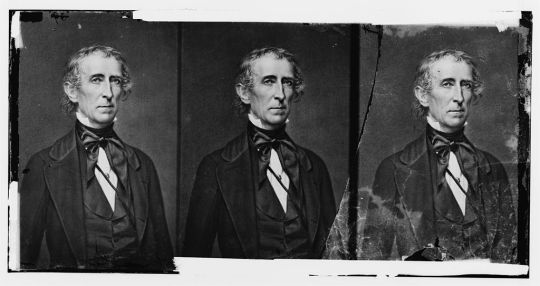
Now, on a warm day at the end of February 1844, Tyler was thinking about whether or not he would support the annexation of Texas. The President also thought of romance. In September 1842, Tyler's wife, Letitia, died in the White House after suffering a stroke. Tyler was still grieving when he began courting Julia Gardiner in January 1843. Tyler had met Julia while his wife was still alive, but he didn't become smitten with her until after his wife's death. Tyler and Julia kept their relationship guarded from the public and the President was even secretive about it to his (very large) family. Part of the reason for his reluctance to be open about his feelings was because Letitia had only been dead for a few months when he started dating Julia. However, a bigger reason was Julia's age. When they began dating, Julia Gardiner was just 22 years old. The 52-year-old President was wary about how his children (he and Letitia had seven children who lived to maturity) would feel about him dating a woman who was five years younger than his oldest daughter.
The age difference also worried Julia's family. Julia Gardiner was the daughter of David Gardiner, a wealthy New York lawyer and former New York State Senator. She was born in 1820 on an island in the Long Island Sound named after her family, and had everything that she wanted or needed while growing up on Gardiner's Island. Julia was beautiful and much in demand by the eligible bachelors of the East Coast. After meeting President Tyler, Julia first tried to reject his advances, but she was certainly intrigued by the powerful and charming Virginian. For his part, Tyler was madly in love with Julia and he first proposed to her in late-1843. Julia's mother did not approve of her daughter marrying a man 30 years older than Julia, so Tyler didn't get an answer. By inviting Julia and her father to accompany him on the USS Princeton, John Tyler hoped to show David Gardiner that he could impress the wealthy New Yorker and demonstrate that he could be a wonderful husband to Julia.
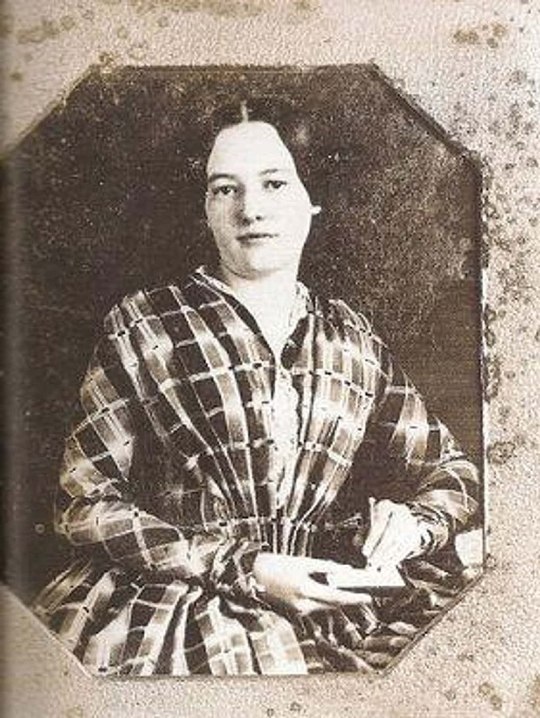
[Julia Gardiner Tyler, around the time of the Princeton explosion and her marriage to President Tyler, c. 1844]
••• Guests gathered at the Washington Navy Yard as ferries transported them across the Potomac River to Alexandria, Virginia, where the USS Princeton was anchored and ready for the afternoon cruise down the Potomac. As dignitaries boarded Captain Stockton's ship, they marveled at the size of the two guns on deck and examined every inch of the 164-foot warship. Music was provided by the United States Marine Band -- "The President's Own" -- and food was served below deck as the Princeton began its leisurely cruise down the Potomac. As guests explored the Princeton and watched the historic sites on both shores of the Potomac pass by, the massive "Peacemaker" gun was fired to the delight of everyone on the ship. The rounds fired by the powerful "Peacemaker" were capable of traveling up to three miles. As the warship cruised down the river the rounds that were fired were aimed at ice floes in the distance which were breaking apart as the afternoon sun warmed the Potomac. The cruise continued, with men mostly on the deck and pretty much all women below deck where food and drinks flowed freely, conversation was genial, and some of the guests were gleefully singing and clearly enjoying themselves.

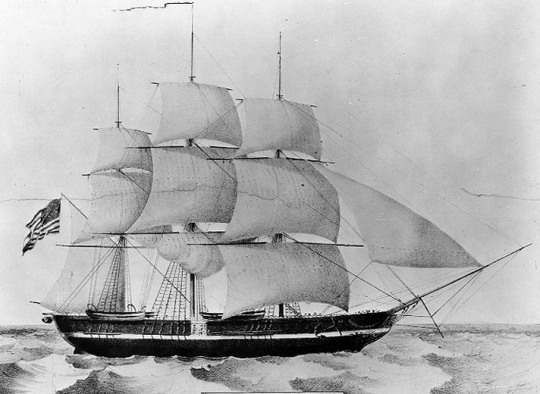
When the Princeton reached Mount Vernon and George Washington's sprawling estate came into view, the ship fired another round from the "Peacemaker" in tribute the first President and then turned around for the return trip to Washington, D.C. The Princeton's passengers had gathered below deck for celebratory toasts and to listen to the impromptu singing concert taking place in the salon. At around 4:00 PM, some of the men requested a chance to witness the "Peacemaker" being fired again, but Captain Stockton demurred, telling the men, "No more guns tonight." However, one of the men who wished to see the "Peacemaker" fired once again was Thomas W. Gilmer, the man who had become Secretary of the Navy just 10 days earlier -- a man who just happened to be Captain Stockton's superior. Gilmer's wish was something akin to an order to Captain Stockton, so Stockton headed to the deck and had the gun prepared to be fired once more.
Many of the men began heading upstairs to witness the firing of the "Peacemaker" while the women mostly remained below deck and continued with their songs and conversations. President Tyler was heading up the gangway plank towards the deck when he was told that his son-in-law, William Waller, the husband of his daughter Elizabeth, was about to sing one of Tyler's favorite songs. Instead of heading to the deck, the President headed back into the salon and was handed a drink. Upstairs, men crowded around the giant "Peacemaker" for one last demonstration of its firing power.
On the deck, Secretary of War William Wilkins jokingly told the spectators, "Though I am Secretary of War, I do not like this firing, and believe I shall run!" before moving to the far side of the Princeton. The remainder of the guests were close to the "Peacemaker" and the big gun was ready to be fired. The Princeton was about 15 miles downriver from Washington, D.C. and two sailors took the final steps for firing the weapon.
Suddenly, at 4:06 PM, a massive explosion rocked the Princeton and the deck was obscured by white smoke and an eerie silence. President Tyler rushed up to the deck to investigate what had happened, but what he found was a horrific scene. The "Peacemaker" -- the largest naval gun in the world -- had exploded at the breech. The powerful explosion tore part of the ship's deck and the "Peacemaker" broke into red-hot pieces of iron that flew into the crowd of spectators. Nobody downstairs was injured, but the deck of the Princeton was a place of horror. Eight people had been killed and 17 were seriously injured, including Captain Stockton and Senator Thomas Hart Benton. As President Tyler reached the deck, the silence turned to anguished screams and confusion.
The President fought through the smoke and found that the toll was high. Secretary of State Abel Upshur was dead -- literally disemboweled by the blast. Navy Secretary Gilmer was dead. The Princeton's Commander Beverly Kennon and two Princeton sailors were dead. American diplomat Virgil Maxcy was dead. President Tyler's slave, Armistead, who had requested and been granted permission from Tyler to view the gun as it was being fired was dead. And, finally, David Gardiner -- the father of the woman that the President hoped to marry -- was also killed by the blast, his arms and legs severed from his body by the force of the explosion. A tearful President was devastated by the loss of two of his senior Cabinet members, and he headed back down below deck to notify the women about what had happened. With dozens of victims and witnesses screaming, crying, and/or in shock throughout the ship, there was an attempt to keep most of the passengers below so that they didn't see the gruesome scene on the deck.
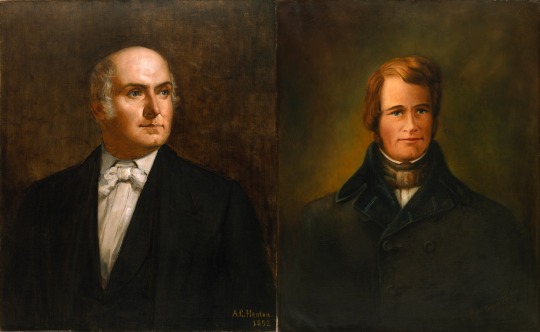
[Secretary of State Abel Upshur and Secretary of the Navy Thomas W. Gilmer, who were both killed by the explosion on Feb. 28, 1844.]
The smoke-filled deck of the Princeton was covered with blood, dismembered limbs, dead bodies, and stunned survivors, many of whom had been wounded by pieces of red-hot, iron shrapnel from the gun or pieces of human beings torn apart by the explosion. Throughout the ship, ears were ringing and people were rendered temporarily deaf by the sound of the blast. Below decks, the women who had accompanied the Princeton awaited more news from above, which quickly trickled downstairs. Someone yelled, "The Secretary of State is dead!" and the news did not improve. When Julia Gardiner found out that her father was among those who had been killed in the blast, she fainted -- directly into the arms of President Tyler. Dolley Madison, who had seen much in her 75 years -- during the War of 1812, she barely escaped the White House shortly before British forces captured Washington and burned the Capitol and the Presidential Mansion -- was certainly stunned by the tragedy aboard the ship, but she quickly did her best to comfort the Princeton's passengers who were shaken and distressed.
As the USS Princeton limped back to Washington, D.C., John Tyler comforted Julia Gardiner as best as he could. For the President, his pleasure cruise with the woman he hoped to marry and her wealthy father could not have gone worse. Now, David Gardiner was literally laying in pieces on the deck of the Princeton as Tyler -- who was also returning to Washington without a Secretary of State or Secretary of the Navy -- tried to console Gardiner's young daughter, but she remained unconscious until the ship arrived back in Alexandria, Virginia.
When the Princeton arrived at Alexandria, President Tyler physically carried Julia Gardiner from the wounded warship. On the gangplank, Julia finally awakened in the President's arms, and as she later said, "I struggled so that I almost knocked both of us off the gangplank. I did not know at the time, but I learned later it was the President whose life I almost consigned to the water." President Tyler had Julia taken directly to the White House where she spent the next few days recuperating under the watchful eyes of the President and his large family.
The bodies of Julia's father, the two dead Cabinet members (Secretaries Upshur and Gilmer), the Princeton's Commander Kennon, and the diplomat Maxcy remained on board the Princeton on the night of February 28th. The injured went to hospitals and homes around the capital city. The next day, Washington was in official mourning as the word of the tragedy spread and the signs of mourning -- black crepe hanging on the White House and other public buildings --were displayed. As Washington mourned, the bodies of Gardiner, Upshur, Gilmer, Kennon, and Maxcy were transported to the White House, where their flag-draped caskets rested in honor in the East Room. (It's safe to assume that President Tyler's slave wasn't awarded the same honors -- when the bodies were removed from the Princeton, they were all placed in magnificent mahogany caskets, except for Armistead, who was placed in one made from cherry. The President did reportedly give Armistead's mother $200.)
After two days of lying in state in the East Room of the White House, Gardiner, Upshur, Gilmer, and Kennon were transferred to St. John's Episcopal Church, where all of official Washington showed up to pay their respects at their joint funeral (Maxcy's family took his remains for a private funeral and burial shortly after his body arrived at the Executive Mansion). It was a solemn occasion -- one of the biggest tragedies to strike the United States up to that point, and a significant loss to President Tyler, both professionally and personally. Tyler was mourning two important members of his Cabinet, and the woman he hoped to marry was burying her father after he had been killed in the most gruesome manner imaginable on a cruise that Tyler had invited him to take.
The funeral started with an ominous and unfortunate signal: the firing of loud artillery across from the Executive Mansion could not have been a pleasant reminder to those who had survived the tragedy on board the Princeton a few days earlier. The bodies of Upshur, Gilmer, Kennon, and Gardiner were taken to Congressional Cemetery following the funeral and buried there, although Gardiner was later exhumed and reburied on Gardiner's Island in New York. After narrowly escaping death or serious injury on the Princeton a few days earlier, President Tyler found himself in danger once again as he left the funeral. Traveling through the busy streets of Washington in his horse-drawn carriage, the President's horses were startled by the crowds and bolted -- leaving Tyler helpless in a runaway carriage until a man bravely rushed out from a hotel entrance and helped stop the carriage.
••• Being comforted by President Tyler and his immediate family in the aftermath of her father's death changed Julia Gardiner's mind about marrying the much older President. Tyler had done everything possible to console her and make her feel safe in the days after the Princeton explosion. Later, Julia would write that, "After I lost my father, I felt differently towards the President. He seemed to fill the place and to be more agreeable in every way than any younger man was or could be." While the loss of her father was certainly tragic, John Tyler happened to be in the right place at the right time, and, in a strange way, David Gardiner's death may have helped spark the romance between the President and Gardiner's daughter. Several weeks after the Princeton tragedy, Tyler asked Julia's mother (who herself was nearly a decade younger than the President!) for her blessing to marry Julia and Mrs. Gardiner approved of the union.
Still, the marriage was not without controversy. The wedding took place on June 26, 1844, just a few months after the Princeton explosion. Julia and her family were still in mourning for Mr. Gardiner, so the wedding was solemn and low-key. Plus, the President's family -- particularly his daughters from his first marriage -- were reluctant to accept his new bride. After all, Tyler's first wife had died less than two years earlier, and Julia Gardiner was about the same age as Tyler's daughters; in fact, she was five years younger than Tyler's oldest daughter. One more unique aspect of the wedding was that this was the first time an incumbent President of the United States had ever gotten married while in office. Normally, it would be blockbuster social news, but the President's wedding was kept strictly private.
Accompanied only by his son, John Tyler III, the President and Julia Gardiner were married at the Church of the Ascension in Manhattan (which is still standing today, at Fifth Avenue and Tenth Street in Greenwich Village) on June 26, 1844. Very few people even knew that the President was in town until after the wedding when they heard the salute from the guns of warships in New York Harbor as he and his new First Lady departed the city (again, maybe firing the guns wasn't the greatest idea for this particular couple at that particular time?). According to one of the only eyewitness accounts of the wedding, published in The New York Morning Express the day after the nuptials, the bride was given away by her brother and and "robed simply in white, with a gauze veil depending from a circlet of white flowers wreathed in her hair." After the ceremony, the wedding party held a dinner at Lafayette Place before the President and Mrs. Tyler departed the city by steamer, staying the night in Philadelphia, before proceeding back to Washington on a special train the next day.

[The Church of the Ascension in Manhattan where President Tyler and Julia Gardiner were married on June 26, 1844.]
When President Tyler left office in 1845, he and his wife retired to Tyler's plantation in Virginia, Sherwood Forest. They had seven children (in addition to the seven surviving children from Tyler's first marriage) and remained happily married, despite the 30-year age difference between the husband and wife. In January 1862, the Tylers headed to Richmond for Tyler's inauguration as a member of the Confederate House of Representatives. Tyler was the only former President who did not remain loyal to the Union during the Civil War. On January 18th, the 71-year-old Tyler died in Richmond's Exchange Hotel, likely due to complications from a stroke and was buried in Richmond's Hollywood Cemetery with Confederate honors. Widely considered a traitor in the North, official notice of Tyler's death wasn't given until 1915 when Congress finally erected a monument near his grave.
Julia Gardiner Tyler lived until 1889, but remarkably, as of 2024, one of President and Mrs. Tyler's grandsons is still living. With seven children (the last of which died in 1947 -- 157 years after John Tyler's birth!), the Tylers were blessed with a wealth of grandchildren and Harrison Ruffin Tyler (born in 1928) is still alive today (his brother, Lyon Gardiner Tyler Jr., died in 2020). In the 1970s, Harrison Tyler purchased and restored his grandfather's beloved Virginia plantation, Sherwood Forest, and often spoke about his family's unique place in history until his health started to fail in recent years.
••• As for the USS Princeton, well, it never truly recovered from the "Peacemaker" explosion. Captain Robert Field Stockton was absolved of blame for the tragedy and went on to fame in California during the Mexican-American War (he has a city named after him near Sacramento), and later was elected a United States Senator from New Jersey. The Princeton participated in engagements in the Gulf of Mexico during the Mexican-American War, but its hull was found to be rotting after the war ended. It was broken up for scrap in Boston and the "Peacemaker's" twin gun -- the "Oregon" -- can be seen today on the grounds of the United States Naval Academy in Annapolis, Maryland.
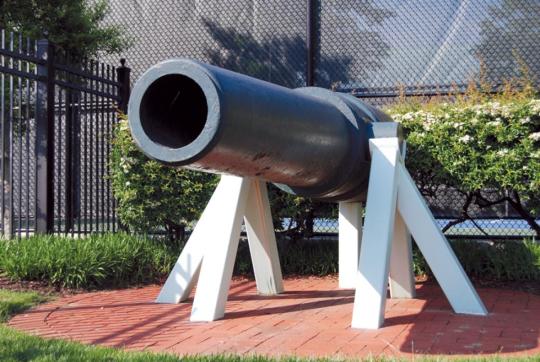
[The "Oregon" gun from the USS Princeton, now on display at the United States Naval Academy in Annapolis, Maryland.]
During World War II, a new USS Princeton was commissioned. A 622-foot-long aircraft carrier, the new Princeton engaged in action in the Pacific Ocean. On October 20, 1944 -- 100 years after the explosion of the "Peacemaker" during President Tyler's Potomac River cruise -- the modern Princeton was attacked by a Japanese dive bomber in the Leyte Gulf and 108 sailors were killed. Even the Princeton's descendants seem to be cursed.

#History#USS Princeton#USS Princeton Explosion#John Tyler#President Tyler#Tyler Administration#Julia Gardiner Tyler#David Gardiner#First Ladies#First Families#Presidential Marriages#Presidential Relationships#Robert Field Stockton#Abel Upshur#Politics#Political History#Military History#WWII#Dolley Madison#Thomas W. Gilmer#Tyler Family#Cabinet of John Tyler#Tyler Cabinet#Presidential History#Presidential Politics#Princeton Explosion#1844 Explosion of the Princeton#U.S. Navy#Naval Accidents#U.S. Naval History
21 notes
·
View notes
Text
In honor of mermay I have drawn the main trio of Camp Camp!
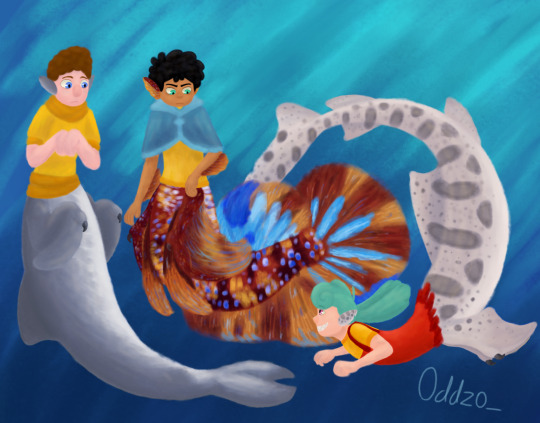
Max is a betta fish, Nikki is a leopard shark, and Neil is a harbor porpoise :D
(Let’s say that this is magical merperson water that both salt and fresh water creatures can live in)
This was supposed to be a silly low effort doodle but I found a new brush and chaos ensued
Because the creativity demons have taken me, I plan to hopefully draw the rest of the Camp Camp characters and maybe some others this month!
(Let’s see how long I last lmao)
Here’s the full list of the species everyone is:
Max- betta fish
Neil- harbor porpoise
Nikki- leopard shark
Harrison- mimic octopus (✨illusion✨)
Nerris- narwhal
Preston- koi (taisho sanke)
Space kid- harp seal
Nurf- Maine lobster (calico mutation)
Dolph- mudskipper (periophthalmus malaccensis)
Ered- yellow lipped sea krait (sea snake)
Jasper- ghost shrimp
David- North American river otter
Gwen- Galapagos sea lion
Quartermaster- electric eel (electrophorus varii)
Campbell- saltwater crocodile
CJ- marine iguana
Daniel- giant river otter
Pikeman- pacific spiny dogfish (sometimes called the piked dogfish lol)
Billy/snake- king snake eel (ophichthus rex)
Petrol- redtail catfish
Jermy- sargassum fish (frogfish)
Penelope Priss (garden mother/flower scouts leader)- zebra lionfish
Sasha- Randall’s pistol shrimp
Erin- dumbo ear guppy
Tabii- lined seahorse (yellow)
-
I have never spent so much time researching aquatic life, I’m going insane. Why can’t I ever get involved in things a normal amount.
(trick question, the answer is ✨neurodivergence✨)
#art#my art#camp camp#camp camp fanart#cc max#max camp camp#camp camp max#max cc#camp camp neil#cc neil#neil camp camp#neil cc#cc nikki#camp camp nikki#nikki camp camp#nikki cc#mermaid#merman#mermay 2024#merpeople#merfolk#digital art#illustration#mermay#camp camp merpeople
23 notes
·
View notes
Text
"Ponyboi" Sundance 2024 Events

Screening Times
January 19, 2024
Variety & Golden Globes Party
At the event, Variety will present its Breakthrough Awards, which highlight the next generation of exceptional talents in front of the camera. This year’s recipients include Dylan O’Brien who stars in “Ponyboi,” Normani who stars in “Freaky Tales,” Maddie Ziegler who stars in “My Old Ass” and Justice Smith who stars in “I Saw the TV Glow” and “The American Society of Magical Negroes” at the festival. Presenters include Megan Park, Maisy Stella, Victoria Pedretti, River Gallo and Brigette Lundy-Paine. River Gallo will be presenting Dylan his Breakthrough Actor Award.
IndieWire Studio Presented by Dropbox
Starting Friday, January 19, the IndieWire Studio will showcase discussions with actors like Lucy Liu (“Presence”), Julia Fox (“Presence”), Jason Schwartzman (“Between the Temples”), Riley Keough (“Sasquatch Sunset”), Kieran Culkin (“A Real Pain”), Dominic Fike (“Little Death”), Saoirse Ronan (“The Outrun”), Renate Reinsve (“Handling the Undead”), Dylan O’Brien (“Ponyboi”), Victoria Pedretti (“Ponyboi”), and more.
January 19, - 21. 2024
Variety Studio Presented by Audible
Beginning Friday, January 19, running through Sunday, January 21, the Variety Studio, presented by Audible, will feature interviews with industry-leading directors and top talent from the films premiering at the Sundance Film Festival. Additionally, talent and creators from the following projects will also participate in the interview studio: “Sue Bird: In The Clutch,” “The American Society of Magical Negroes,” “Sasquatch Sunset,” “Presence,” “The Outrun,” “Little Death,” “Super/Man: The Christopher Reeve Story,” “Krazy House,” “Ponyboi,” “Chrissy & Dave Dine Out,” “A Different Man,” “Exhibiting Forgiveness” and “Your Monster.”
Collider & Film.io Media Studio
This year we’re thrilled to announce we’ve booked some major talent for our Media Studio, including Kristen Stewart, Ed Harris, Katy O’Brian, Dave Franco, Alicia Silverstone, Riley Keough, Melissa Barrera, David Schwimmer, Jena Malone, Jason Schwartzman, Kelvin Harrison Jr., Dylan O’Brien, Victoria Pedretti, Carol Kane, Brittany O’Grady, Leslie Grace, Sasha Calle, June Squibb, Fred Hechinger, Maddie Ziegler, and loads more. Just a handful of the films and events we’ll be celebrating include Rose Glass’s Love Lies Bleeding, Your Monster, Lolla: The Story of Lollapalooza, Ponyboi, Between the Temples, and many more.
January 20, 2024
"Ponyboi" Word Premiere
Cast Party for Ponyboi
Chase Sapphire on Main, 573 Main St., Park City, 6:30-9 p.m. Filmmaker Esteban Arango joins his cast members Dylan O’Brien, Victoria Pedretti, Indya Moore and River Gallo for a celebration. Event only available to Sapphire Reserve cardmembers who purchased VIP packages through Ultimate Rewards.
January 21, 2024
SAGindie Actors Only Brunch
Cafe Terrigo, 424 Main St., Park City, 11 a.m.-1 p.m. The 27th annual installment, a private, invitation-only event, will host Melissa Barrera (Your Monster), Jay Ellis (Freaky Tales, Sue Bird: In the Clutch), Aunjanue Ellis-Taylor (Exhibiting Forgiveness), River Gallo (Ponyboi), Theo Germaine (Desire Lines), Katy O’Brian (Love Lies Bleeding), Maddie Ziegler (My Old Ass), Dylan O’Brien (Ponyboi), Jena Malone (Little Death, Love Lies Bleeding).
Sources: variety.com, hollywoodreporter.com, variety.com, collider.com & indiewire.com
25 notes
·
View notes
Text
Thanks for the tag @wheel-of-fish! This was a fun one... My top 10 comfort films:
1. I Remember Mama (Irene Dunne)
2. The Long Long Trailer ( Lucille Ball)
3. Always (Holly Hunter & Richard Dreyfuss)
4. The Ghost and Mrs. Muir (Rex Harrison & Gene Tierney)
5. The Sound of Music (Julia Andrews & Christopher Plummer)
6. Seven Brides for Seven Brothers (Jane Powell & Howard Keel)
7. Both Snowy River Movies (Sigrid Thornton & Tom Burlinson) *I don't care if it's cheating, I couldn't choose between them
8. Persuasion 1995 (Amanda Root & Ciaran Hinds)
9. Canterville Ghost ( Charles Laughton)
10. Labyrinth (David Bowie & Jennifer Connelly)
Beauty and the Beast and The Secret of Nimh were contenders but since they are animated I will save them for another tag game... Honorable mentions that almost made the list are Sabrina (Audrey Hepburn), Cheaper by the Dozen (The 1950 version with Myrna Loy), The Shop Around the Corner (Jimmy Stewart & Margaret Sullavan), and The Quiet Man, and Yours Mine & Ours ( the original with Lucille Ball & Henry Fonda)
Tagging with no pressure @battydings, @illuminaughti-online, @from-aldebaran, @jennyfair7, @ladystormcrow
18 notes
·
View notes
Text

I was reading the interpretive signs at Fort Miamis when I had a John Graves Simcoe encounter in the wild, paging @acrossthewavesoftime!
Simcoe penned one of the Letters From 1794 excerpted on this sign!

I have to laugh at "Mr. Wayne" for General "Mad" Anthony Wayne. Wayne, Simcoe, and Wayne's aide-de-camp William Henry Harrison all used Maumee/Miami interchangeably for what is called the Maumee River today. Simcoe makes it plural with "Miamis."
I don't know why I'm surprised when I was already aware that Simcoe built Fort Miamis?? It's right there in the opening chapters of William Henry Harrison and the Conquest of the Ohio Country: Frontier Fighting in the War of 1812 by David Curtis Skaggs:
The governor general of Canada, Sir Guy Carleton, recently elevated to the peerage as Lord Dorchester, promised such aid [to Indigenous allies] because he expected the United States and Great Britain to be at war shortly and, if so, they could expect direct assistance from His Majesty's government. To implement this, Carleton ordered John Graves Simcoe, the lieutenant governor of Upper Canada (modern Ontario), to construct a fort near the rapids of the Maumee River. (Named Fort Miamis, though often designated Fort Miami on early maps, was located in what is now the eastern edge of Maumee, Ohio, on the river's north bank.) All this was an aspect of a British desire to create an Indian barrier state between the lakes and the Ohio River [...]
I'll say it again: John Graves Simcoe may have had the greatest effect on the War of 1812, for a person who didn't live to see it.
What were Simcoe's thoughts on the aftermath of the Battle of Fallen Timbers? Did he know that the gates of Fort Miamis were closed to the Indigenous allies of the British, who fled there for shelter from Wayne's army?
#northwest indian war#war of 1812#john graves simcoe#anthony wayne#fort miamis#ohio#military history#genuinely want to know what simcoe thought#simcoe is one of the few powerful people in this sphere with a functioning moral compass#i still can't believe some tv show made simcoe a villian lmao what
14 notes
·
View notes
Text
i’m insane so i complied a list of celebrities with scorpio placements
scorpio sun/moon/rising: björk, katy perry
scorpio sun/moon: mads mikkelsen, brittany murphy, penn badgley, alexa chung, ryan reynolds, whoopi goldberg, owen wilson
scorpio moon/rising: beyoncé, bernadette peters, george harrison, phoebe tonkin, jimmy fallon
scorpio sun/rising: chloe sevigny
scorpio sun: jeff buckley, frank ocean, björk, adam driver, mia goth, ethan hawke, courtney barnett, lorde, drake, margaret qualley, nina gordon
scorpio moon: lady gaga, sky ferreira, alex turner, mila kunis, margot robbie, scarlett johansson, january jones, miles teller, wes anderson, kate moss, alanis morissette, morrissey
scorpio rising: fiona apple, lana del rey, mitski, david lynch, prince, dolores o’riordan (the cranberries), jennifer coolidge, river phoenix, jessica chastain, emily dickinson, jim carrey, nicole kidman, taylor swift, victoria justice, tori amos, debbie harry (blondie), halsey, nina persson (the cardigans), alexander skarsgard, michelle williams
43 notes
·
View notes
Text

Percy Fawcett poses in a 1911 photograph. Photograph Bridgman/ACI
The Man Who Died Searching For The Lost City of Z
In 1925, Explorer and Surveyor Percy Fawcett Disappeared In The Amazon Basin Looking For An Ancient Civilization. Although He Was Inspired By Questionable Sources, We Now Know If His Search was in Vain.
— By Jordi Canal-Soler | June 13, 2024
When the Spanish first ventured into the Amazon Basin in the 1540s, they recorded Indigenous accounts of a lost city of fantastic wealth that they called El Dorado (“the golden”). Over the centuries, many vain attempts were made to locate a lost civilization in the Amazon rainforest.
The last significant attempt to find such a culture was undertaken by British explorer Percy Fawcett. Between 1906 and 1924, Fawcett made seven expeditions across the Amazon Basin, concluding with his doomed quest to find the city he called Z. Fawcett was inspired by his extensive reading of historical sources, including a mysterious document known as Manuscript 512.
A man of extraordinary mental and physical stamina, Fawcett was working at a time when the Amazon region was still largely undocumented by Europeans who sought to explore its jungles and waterways, seeking ancient cities and riches. His disappearance during his search for Z in 1925, in the Mato Grosso region of Brazil, continues to intrigue writers and filmmakers.
Yearning To Explore
Percy Harrison Fawcett was born in 1867 in Torquay, Devon, the English county that had produced many famous explorers and mariners, including Francis Drake and Walter Raleigh.
The son of an aristocrat who had lost his fortune, Fawcett described his childhood as lacking in affection. At age 19, he was commissioned as a lieutenant in the Royal Artillery and sent to outposts of the British Empire.

This image was taken by Percy Fawcett on the upper Acre River in Bolivia, near the Brazil border, during an expedition. The region had suffered greatly at the hands of rubber exploiters. Royal Geographical Society/Getty Images
In 1901, Fawcett joined the Royal Geographical Society of London and traveled to Africa as a surveyor in the service of the British state, tasked with gathering military intelligence. In 1906, he was commissioned by the society to lead an expedition to the Amazon.
Arriving in South America was the moment his whole life changed. Setting out from La Paz to map the vast territory on the borderlands of Bolivia and Brazil, Fawcett often faced hostility from Indigenous peoples angered by rubber barons, who had invaded their lands to extract rubber for use in car and train manufacturing.
For nearly a decade he roamed the Amazon Basin, often the first European to record geographical features such as waterfalls. His writing gives a sense of the awe he experienced:


Fawcett’s Last Journey: After completing seven South American mapping expeditions for Britain’s Royal Geographical Society, Percy Fawcett returned in 1925 to search for the lost city of Z. He left from the same camp where his horse died on a previous expedition and was never heard from again. Source: David Grann, The Lost City of Z: A Tale of Deadly Obsession in the Amazon | NGM Staff
————Route of Fawcett’s 1925 Expedition | ++++++ Railroad
Above us rose the Ricardo Franco hills, flat topped and mysterious, their flanks scarred by deep quebradas [ravines]. They stood like a lost world, forested to their tops, and the imagination could picture the last vestiges of an age long vanished.
The outbreak of World War I interrupted this rich period of exploration, forcing him to return to Europe. Although in his 50s, Fawcett was in peak physical condition, and he proved to be an outstanding soldier.
A Mysterious Manuscript
Fawcett could not shake off the allure of South America, however. So, when the war ended, he returned to Brazil, where he would pursue an idea that led him to his last great adventures and, ultimately, his mysterious death.
Although Fawcett often relied on racist tropes and ideas when he wrote of Brazil’s Indigenous peoples, he also made great efforts to understand their customs and languages.
He lamented the effects of colonialist greed on these societies and became convinced that Spanish and Portuguese accounts from the 16th and 17th centuries of complex civilizations in the rainforest may have had merit. Such accounts mention “very large settlements” as well as “fine roadways in the interior.”
One document in particular fascinated Fawcett. Known as Manuscript 512 and written in Portuguese, it is purportedly an account by adventurers and fortune hunters. In 1753, in search of precious metals, the adventurers found a ruined city boasting monumental buildings, roads, and a plaza, in “each corner of which is a spire, in the style of the Romans.”

Mystery Manuscript! The document that partly inspired Fawcett’s search for Z is kept in Brazil’s National Library. Manuscript 512 is considered a forgery by some scholars, although Fawcett was not the only one who believed it was authentic. Explorer Richard Burton was intrigued by it during his travels in Brazil in the 1860s. National Library, Brazil
Scholars are divided about the manuscript’s authenticity. Skeptics consider it a forgery. Brazil achieved independence from Portugal in 1825. It would have been useful for a new, insecure republic to “discover” a document that described ancient civilizations in its territory—akin to the great Maya sites in Central America. Many at the time, however, accepted the manuscript’s authenticity, including Fawcett, already convinced that early accounts of complex civilizations in the rainforest were accurate. He became obsessed with finding such a place.
In Search of Z
Although Fawcett was inspired by Manuscript 512’s claims, he never intended to find the city it described. The settlement in that document lies, supposedly, in Brazil’s northeast. Citing other sources (which he did not name), Fawcett became convinced that a lost civilization existed in the wild, central-western region of Mato Grosso. He named the city Z.
In April 1925, Fawcett set out from Cuiabá to find it, accompanied by his eldest son, Jack, and his son’s best friend, Raleigh Rimell. The last news from them was in a letter Fawcett sent to his wife: “We shall disappear from civilization until next year. Imagine us ... in forests so far untrodden by civilised man.”
And then they really did disappear. Were they killed by animals or people? Several expeditions were launched in an attempt to clarify what happened, including one headed by Peter Fleming, brother of the James Bond creator Ian Fleming. Many of these ventures also ended in tragedy. And none shed any light on what happened to Fawcett.
In 1952, anthropologist Orlando Villas-Bôas announced he had found the bones of the explorer and that Kalapalo Indians had confessed to killing him. Later forensic analysis showed the remains did not belong to Fawcett.

For a decade, Fawcett roamed the Amazon Basin. His writings, which his son compiled in this posthumous 1953 book, give a sense of the awe he experienced.
Fawcett’s story has had an enduring cultural impact. He is one of the inspirations for the character Indiana Jones. (The Walt Disney Company is a majority owner of National Geographic Media.) The English explorer was also the subject of David Grann’s The Lost City of Z: A Tale of Deadly Obsession in the Amazon, the basis for a 2016 feature film. In his book, Grann quotes Kalapalo Indians, who insist they had not killed Fawcett. They had seen the smoke from Fawcett’s camp for a few days until it stopped. They say he likely died at the hands of “hostile” people in territory to the east.
Although the mystery of his last days may never be fully resolved, Fawcett’s quest for a lost city may be at an end. In the decades since his disappearance, exploration of northeastern Mato Grosso has uncovered the remains of large urban settlements, now located in Xingu Indigenous Park. Named Kuhikugu, the complex includes remnants of streets, bridges, and large squares. Modern lidar scans further suggest that between 1,500 and 400 years ago, this part of the Amazon was indeed the site of a large settlement. While Z’s exact identity and location are still a mystery, Fawcett’s hunch about a hidden ancient city in the region seems to have been correct.
#Lost City#Exploration#Explorers#Mysteries#Rainforest#Treasure Hunting#History Magazine#Percy Fawcett#Lost City of Z#Disappearance | 1925 | Explorer 🧭 | Surveyor | Percy Fawcett#Amazon Basin#Ancient Civilization#Mysterious Manuscript#In Search of Z
2 notes
·
View notes
Note
Fantasy Recs:
The Book of Jhereg by Steven Brust (Dragaera) Black God's Kiss by C.L. Moore (Jirel of Joiry) Waylander by David Gemmell (Waylander) The Blacktongue Thief and Between Two Fires by Christopher Buehlman (Blacktongue) Assassin’s Apprentice by Robin Hobb (Realm of the Elderlings) The Blade Itself by Joe Abercrombie (The First Law) A Game of Thrones by George R.R. Martin (A Song of Ice and Fire) The Curse of Chalion by Lois McMaster Bujold (World of the Five Gods) The Dragonbone Chair by Tad Williams (Memory, Sorrow, and Thorn) Chronicles of the Black Company by Glen Cook (The Black Company) The Dragon’s Path by Daniel Abraham (The Dagger and the Coin) The Traitor Baru Cormorant by Seth Dickinson (The Masquerade) Johannes Cabal the Necromancer by Jonathan L. Howard (Johannes Cabal) The Folding Knife by K.J. Parker The Devourers by Indra Das Jonathan Strange & Mr. Norrell and Piranesi by Susanna Clarke A Country of Ghosts by Margaret Killjoy The Colour of Magic by Terry Pratchett (Discworld) City of Bones by Martha Wells The Alchemy of Stone by Ekaterina Sedia A Woman of the Sword by Anna Smith Spark Those Above by Daniel Polansky (The Empty Throne) The Spear Cuts Through Water by Simon Jimenez The Dragon Waiting by John M. Ford Books of Blood by Clive Barker Tigana by Guy Gavriel Kay The Chatelaine by Kate Heartfield The Etched City by K.J. Bishop The Saint of Bright Doors by Vajra Chandrasekera Gormenghast by Meryn Peake Viriconium by M. John Harrison Black Leopard, Red Wolf by Marlon James (The Dark Star)
Horror Recs:
North American Lake Monsters by Nathan Ballingrud The Marigold by Andrew F. Sullivan The Beautiful Thing That Awaits Us All by Laird Barron The Wingspan of Severed Hands by Joe Koch A Collapse of Horses by Brian Evenson The Immeasurable Corpse of Nature by Christopher Slatsky Negative Space by B.R. Yeager A Natural History of Hell by Jeffrey Ford We Have Always Lived In The Castle by Shirley Jackson Furnace by Livia Llewelyn Manhunt by Gretchen Felker-Martin The Salt Grows Heavy by Cassandra Khaw Tell Me I'm Worthless by Alison Rumfitt Queen of Teeth by Hailey Piper Leech by Hiron Ennes
Sci-Fi Recs:
An Unkindness of Ghosts by Rivers Solomon The Left Hand of Darkness by Ursula K. Le Guin Rosewater by Tade Thompson (Rosewater) Ammonite by Nicola Griffith Dawn by Octavia E. Butler (Xenogenesis) A Scanner Darkly by Philip K. Dick Annihilation by Jeff VanderMeer Dhalgren by Samuel R. Delany Bang Bang Bodhisattva by Aubrey Wood
AHHHHH!!! THANK YOU SO MUCH!!! All go on The List!! Can't wait to check all of them out!
6 notes
·
View notes
Text
Rock Musicians Rated Based on Wether They Would Like Anime or Not.
This is a completely normal thing to think about. I'm a completely normal person.
Jimmy Hendrix- Would have loved Cowboy Bebop and Gundam. If he had been a child in the 2000s then he would have dressed as Sasuke for Halloween.
John Lennon- Would have been a big attack on titan fan and frequently gotten into online arguments. Lightly ashamed of being into anime. Has a crush on the evil woman from Chainsawman.
Paul Mccartney- Would not be an anime fan. Apathetic towards anime.
George Harrison- Has seen the 1997 Berserk Series and Ghost in the Shell. Not into anime, but willing to see it.
Ringo Starr- Would not be an anime fan, but he wouldn't mind seeing a Ghibli film.
Eric Clapton- Would regularly make fun of anyone into anime.
Gerald Way- Confirmed fan of anime.
Thom Yorke- Has possible watched a few anime. Would probably love Neon Genesis Evangelion.
Rivers Cuomo- Has most likely watched an anime. Would probably be into very weird and niche romance anime stuff.
David Bowie- David Bowie would either, A. have watched a few well known anime like Death Note and Full metal Alchemist but not be really all that into anime or B. be the biggest anime fan ever, but like, in a bisexual way.
Kurt Cobain- Enjoys slice of life anime, but not in a weird way.
Dave Grohl- Has mostly likely watched something anime, but I doubt he sees it as different from other cartoons.
Courtney Love- Extremely toxic RWBY fan. Regularly gets into arguments over ships.
David Byrne- I am confident that David Bryne has watched some anime at some point. I don't know what, but he definetly has. Would probably love Akira.
Freddy Mercury- I had to think about this long and hard and I think Freddy would be into shonen like Dragon ball Z.
Brian May- Would not be into anime.
Billy Joe Armstrong- Has most definetly seen an anime before. If he was born two decades later then he would have been the biggest Jojo fan ever.
Alex Turner- Hah! No.
Bono- Into "intellectual" anime like Neon Genesis Evangelion. Has seen multiple Satoshi Kon films.
Bruce Springsteen- No.
Robert Fripp- Robert Fripp was born in the wrong generation. Had he been a millenial, then Robert would be obsessed. He would attend anime conventions, wear cosplay, and regularly get into arguments online.
Pete Townshend- Casual anime watcher who's seen one or two and is kind of ashamed about it because of the internet.
Roger Waters- Constantly getting into arguments about Gundam online. Is a moderator of some anime subreddit.
David Gilmore- No.
Lou Reed- Used to regularly make fun of anime because of...you know...but somehow ended up becoming really into it, like really into it.
Ian Anderson- Watches the weirdest fucking anime. Just the strangest shit you have ever seen.
Jon Anderson- Steve seems like a big fan of all things cyberpunk. He'd love Akira and Ghost in the Shell, and would definetly enjoy the Blame! manga.
Steve Howe- Has not seen any well known anime, but has seen some lesser known stuff that's "weird in a good way".
Patti Smith- Kawoshin shipper.
Bill Bruford- No.
Joan Jett- Nah.
2 notes
·
View notes
Text
Books read and movies watched in 2023 (July to December):
Bolded verdicts (Yes!/Yes/Eh/No/NO) are links to more in-depth reviews! Should you watch/read them?
Books (fiction):
The Starless Sea (Erin Morgenstern): No
The Inheritance of Orquídea Divina (Zoraida Córdova): Yes
Brave New World (Aldous Huxley): No
The Association of Small Bombs (Karan Mahajan): No
Pond (Claire-Louise Bennett): NO
Heaven (Mieko Kawakami): No
The Verifiers (Jane Pek): No
The Old Capital (Yasunari Kawabata): No
Falling Man (Don DeLillo): No
A Free Life (Ha Jin): Yes
People of the Book (Geraldine Brooks): No
The Spectacular (Fiona Davis): No
Klara and the Sun (Kazuo Ishiguro): Yes
Children of the Jacaranda Tree (Sahar Delijani): No
This Place: 150 Years Retold (anthology): Yes
Books (nonfiction):
The Forgetting River (Doreen Carvajal): Eh
Valiant Women: The Extraordinary American Servicewomen Who Helped Win World War II (Lena S. Andrews): Yes
Mozart's Starling (Lyanda Lynn Haupt): Yes
Poetic Form & Poetic Meter (Paul Fussell): No
Western Wind: An Introduction to Poetry (David Mason & John Frederick Nims): No
A Poetry Handbook (Mary Oliver): Yes
We Should Not Be Friends (Will Schwalbe): No
Seen from All Sides (Sydney Lea): No
Books (poetry):
Afterworlds (Gwendolyn MacEwen): Eh
Sailing Alone Around the Room (Billy Collins): Yes
Be With (Forrest Gander): No
Pictures from Brueghel and Other Poems (William Carlos Williams): Yes
Horoscopes For the Dead (Billy Collins): No
The Wild Iris (Louise Gluck): Eh
Moon Crossing Bridge (Tess Gallagher): Yes
Who Shall Know Them? (Faye Kicknosway): Yes
Great Blue (Brendan Galvin): No
Collected Poems (Basil Bunting): Eh
Paterson (William Carlos Williams): No
Selected Poems (Donald Justice): No
Dear Ghosts, (Tess Gallagher): No
The Death of Sitting Bear (N. Scott Momaday): No
Evidence (Mary Oliver): No
What Have I Ever Lost by Dying? (Robert Bly): Yes
Blessing the Boats (Lucille Clifton): Yes
Source (Mark Doty): No
Tell Me (Kim Addonizio): Eh
Zoo (Ogden Nash): No
Alive Together: New and Selected Poems (Lisel Mueller): No
“A” (Louis Zukovsky): NO
Flying at Night (Ted Kooser): Yes
The Man in the Black Coat Turns (Robert Bly): Yes
This Tree Will Be Here for a Thousand Years (Robert Bly): No
Nine Horses (Billy Collins): Yes
Arabian Love Poems (Nizar Kabbani): Yes
Delights & Shadows (Ted Kooser): Yes
This Great Unknowing (Denise Levertov): Yes
Young of the Year (Sydney Lea): No
Pursuit of a Wound (Sydney Lea): No
The Life Around Us (Denise Levertov): No
Red List Blue (Lizzy Fox): No
It Seems Like A Mighty Long Time (Angela Jackson): No
Some Ether (Nick Flynn): Yes
Divide These (Saskia Hamilton): No
The Simple Truth (Philip Levine): No
Saving Daylight (Jim Harrison): Eh
Midnight Salvage (Adrienne Rich): No
The Trouble with Poetry and Other Poems (Billy Collins): Eh
My Brother Running (Wesley McNair): Eh
Whale Day (Billy Collins): Eh
Talking Dirty to the Gods (Yusek Komunyakaa): No
A New Selected Poems (Galway Kinnell): No
The Dolphin (Robert Lowell): No
Star Route (George Longenecker): No
Brute (Emily Skaja): Eh
No Witnesses (Paul Monette): Yes!
Blood, Tin, Straw (Sharon Olds): No
Town Life (Jay Parini): No
Dead Men's Praise (Jacqueline Osherow): No
Stag's Leap (Sharon Olds): No
Sleeping with the Dictionary (Harryette Mullen): No
Looking for the Parade (Joan Murray): No
Sparrow (Carol Muske-Dukes): Yes
You can't Get There from Here (Ogden Nash): No
Carver: a Life in Poems (Marilyn Nelson): Yes
The House of Blue Light (David Kirby): No
Ariel (Sylvia Plath): No
Caribou (Charles Wright): No
The Collected Verse of Theodore Roethke: No
Letters from Maine (Mary Sarton): No
Diasporic (Patty Seyburn): Eh
The Five Stages of Grief (Linda Pastan): Yes!
Not One Man’s Work (Leland Kinsey): Yes
Wise Poison (David Rivard): Yes
The Continuous Life (Mark Strand): Eh
On the Bus with Rosa Parks (Rita Dove): Yes
Fuel (Naomi Shihab Nye): Yes
Ludie’s Life (Cyntha Rylant): Yes
Wise Poison (David Rivard): Yes
My Name on His Tongue (Laila Halaby): Yes
Messenger (Ellen Bryant Voigt): Yes!
Unfortunately, it was Paradise: Selected Poems (Mahmoud Darwish): Eh
The Collected Poetry of James Wright: No
The Unlovely Child (Norman Williams): No
The New Young American Poets (anthology, 2000): Yes
The Black Maria (Aracelis Girmay): Yes!
Night Sky with Exit Wounds (Ocean Vuong): Yes!
Thoughts of Her. (Casey Conte): NO
Standing Female Nude (Carol Ann Duffy): Yes!
The Tradition (Jericho Brown): Yes
Girls That Never Die (Safia Elhillo): No
Repair (C. K. Williams): No
The Big Smoke (Adrian Matejka): Yes
American Wake (Kerrin McCadden): Eh
Collected Poems (Jane Kenyon): No
E-mails from Scheherazad (Mohja Kahf): Yes!
I Had a Brother Once (Adam Mansbach): No
Holding Company (Major Jackson): No
Hunting Down the Monk (Adrie Kusserow): No
Happy Life (David Budbill): No
Prelude to Bruise (Saeed Jones): No
Wade in the Water (Tracy K. Smith): Eh
Penury (Myung Me Kim): Yes!
Commons (Myung Mi Kim): Yes!
The Final Voicemails (Max Ritvo): No
Pieces of Air in the Epic (Brenda Hillman): No
Gone (Fanny Howe): No
A Vermonter's Heritage: Listening to the Trees (Rick Bessette): No!
Roget's Illusion (Linda Bierds): No
First Hand (Linda Bierds): No
The Other Side (Julia Alvarez): No
Pig Dreams: Scenes from the life of Sylvia (Denise Levertov): Yes
Movies:
Winter Evening in Gagra (1985, Karen Shakhnazarov): Yes
My Tender and Affectionate Beast (A Hunting Accident) [1978, Emil Loteanu]: No
Fate of a Man (1959, Sergei Bondarchuk): Eh
Ordinary Fascism (aka Triumph Over Violence) (1965, Mikhail Romm): Yes
The Most Charming and Attractive (1985, Gerald Bezhanov): Yes
Gals/The Girls (1961, Boris Bednyj): Yes
Drunken Angel (1948, Akira Kurosawa): Yes
Stray Dog (1949, Akira Kurosawa): No
Viy (1967, Konstantin Yershov/Georgi Kropachyov): No
Battleship Potemkin (1925, Sergei Eisenstein): Yes
Amarcord (1973, Federico Fellini): Yes!
Charade (1963, Stanley Donen): No
Dreams (1990, Akira Kurosawa): Yes!
Barton Fink (1991, Coen Brothers): No
Kidnapping, Caucasian Style (1967, Leonid Gaidai): No
Unbelievable Adventures of Italians in Russia (1974, Eldar Ryazanov & Franco Prosperi): Yes
By the White Sea (2022, Aleksandr Zachinyayev): Yes
Ivan’s Childhood (1962, Andrei Tarkovsky): Yes!
The Third Man (1949, Carol Reed): Yes!
The Kitchen in Paris (2014, Dmitriy Dyachenko): No
Optimistic Tragedy (1963, Samson Samsonov): Eh
White Moss (2014, Vladimir Tumayev): Yes
Oppenheimer (2023, Christopher Nolan): Yes!
Scarlet Sails (1961, Alexandr Ptushko): Yes
We'll Live Till Monday (1968, Stanislav Rostotsky): Yes
Vladivostok (2021, Anton Bormatov): No
Ballad of a Soldier (1959, Grigory Chukhray): Yes
The Theme (1979, Gleb Panfilov): Yes
A Haunting in Venice (2023, Kenneth Branagh): Yes
Barbie (2023, Greta Gerwig): Yes
Is It Easy To Be Young? (1986, Juris Podnieks): Yes
Badlands (1973), Terrence Malick: Yes
Satyricon (1969, Federico Fellini): No
Aguirre, the Wrath of God (1972, Werner Herzog): Yes
Fitzcarraldo (1982, Werner Herzog): No
The Illusionist (2006, Neil Burger): Yes
The Duchess (2008, Saul Dibb): Yes
Pride & Prejudice (2005, Joe Wright): Yes!
Emma (1996, Douglas McGrath): No
And here’s Part 1 of my 2023 list!
3 notes
·
View notes
Text
mid summer lull

David Hockney - Swimming Pool Fire Island
::

Roland Petersen - Lagoon Picnic, 1971
::

Leah Gardner - Marmalade
::

Tom Wesselmann - Fast Sketch Still Life with Fruit and Goldfish
::

Jun Kaneko
::

Sigurdur Gudmundsson - Study for Horizon
::

Mark Manders
::
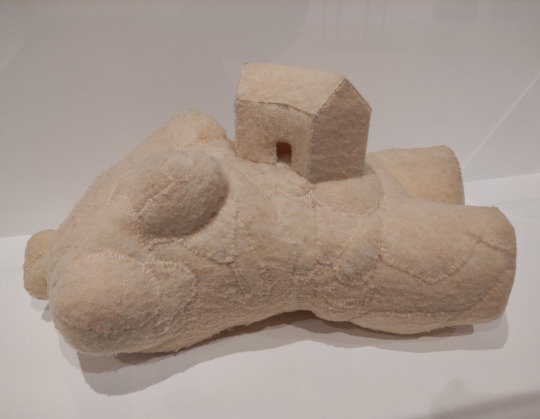
Louise Bourgeois - Femme Maison
::

David Batchelor - Concreto 6.0 01
::

Karlo Andrei Ibarra
::
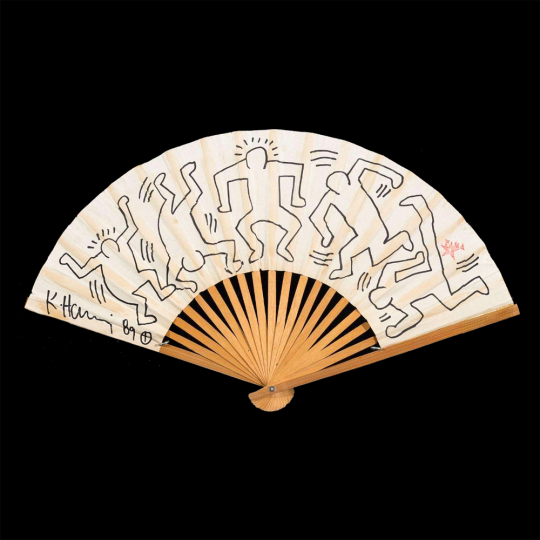
Keith Haring - Fan for Grace Jones
::

Charles Pétillon - He got game
::
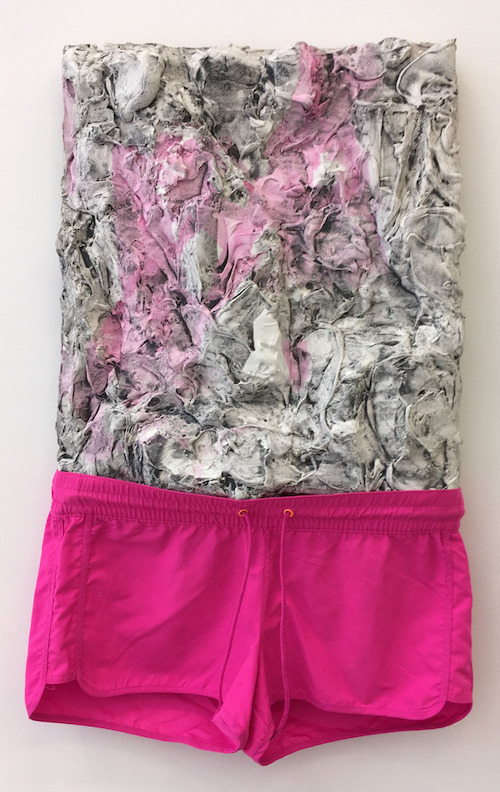
Rachel Harrison
::

Wayne Thiebaud - Winding River
::
Sunday: kimono my house
7 notes
·
View notes
Text
GROVER CLEVELAND •Grover Cleveland: A Study In Courage by Allan Nevins (BOOK) •An Honest President: The Life and Presidencies of Grover Cleveland by H. Paul Jeffers (BOOK | AUDIO) •A Secret Life: The Lies and Scandals of President Grover Cleveland by Charles Lachman (BOOK | KINDLE | AUDIO) •A Man of Iron: The Turbulent Life and Improbable Presidency of Grover Cleveland by Troy Senik (BOOK | KINDLE | AUDIO)
BENJAMIN HARRISON •Benjamin Harrison: Hoosier Warrior, 1833-1865 by Harry J. Sievers (BOOK) •Benjamin Harrison: Hoosier Statesman, 1865-1888 by Harry J. Sievers (BOOK) •Benjamin Harrison: Hoosier President, 1889-1893 by Harry J. Sievers (BOOK)
WILLIAM McKINLEY •In the Days of McKinley by Margaret Leech (BOOK) •President McKinley: Architect of the American Century by Robert W. Merry (BOOK | KINDLE) •William McKinley and His America by H. Wayne Morgan (BOOK | KINDLE) •The Triumph of William McKinley: Why the Election of 1896 Still Matters by Karl Rove (BOOK | KINDLE | AUDIO)
THEODORE ROOSEVELT •The Rise of Theodore Roosevelt by Edmund Morris (BOOK | KINDLE | AUDIO) •Theodore Rex by Edmund Morris (BOOK | KINDLE | AUDIO) •Colonel Roosevelt by Edmund Morris (BOOK | KINDLE | AUDIO) •Edmund Morris Trilogy •The River of Doubt: Theodore Roosevelt's Darkest Journey by Candice Millard (BOOK | KINDLE | AUDIO) •Mornings On Horseback: The Story of an Extraordinary Family, a Vanished Way of Life, and the Unique Child Who Became Theodore Roosevelt by David McCullough (BOOK | KINDLE | AUDIO) •T.R.: The Last Romantic by H.W. Brands (BOOK | KINDLE | AUDIO)
WILLIAM HOWARD TAFT •The Bully Pulpit: Theodore Roosevelt, William Howard Taft, and the Golden Age of Journalism by Doris Kearns Goodwin (BOOK | KINDLE | AUDIO) •William Howard Taft: An Intimate History by Judith Icke Anderson (BOOK) •Chief Executive to Chief Justice: Taft Betwixt the White House and Supreme Court by Lewis L. Gould (BOOK | KINDLE)
WOODROW WILSON •Wilson by A. Scott Berg (BOOK | KINDLE | AUDIO) •Woodrow Wilson: A Biography by John Milton Cooper Jr. (BOOK | KINDLE | AUDIO) •When the Cheering Stopped: The Last Years of Woodrow Wilson by Gene Smith (BOOK | KINDLE) •The Ordeal of Woodrow Wilson by Herbert Hoover (BOOK) •The Moralist: Woodrow Wilson and the World He Made by Patricia O'Toole (BOOK | KINDLE | AUDIO)
WARREN G. HARDING •The Shadow of Blooming Grove: Warren G. Harding in His Times by Francis Russell (BOOK) •The Available Man: The Life Behind the Masks of Warren G. Harding by Andrew Sinclair (BOOK) •1920: The Year of the Six Presidents by David Pietrusza (BOOK | KINDLE | AUDIO) •The Ohio Gang: The World of Warren G. Harding by Charles L. Mee Jr. (BOOK | KINDLE)
CALVIN COOLIDGE •Coolidge by Amity Shlaes (BOOK | KINDLE | AUDIO) •The High Tide of American Conservatism: Davis, Coolidge, and the 1924 Election by Garland S. Tucker III (BOOK | KINDLE)
#Books#Book Suggestions#Book Recommendations#Books About Presidents#Presidents#Presidency#Presidents Books#Presidential Books#Grover Cleveland#President Cleveland#Cleveland Administration#Benjamin Harrison#President Harrison#Harrison Administration#William McKinley#President McKinley#McKinley Administration#Assassination of William McKinley#McKinley Assassination#Theodore Roosevelt#President Roosevelt#Roosevelt Administration#TR#William Howard Taft#President Taft#Taft Administration#Woodrow Wilson#President Wilson#Wilson Administration#Warren G. Harding
33 notes
·
View notes
Text
My personal reading challenge this year is 40. I'll keep track of them here.
Infinite Jest by David Foster Wallace
From the River to the Sea: Essays for a Free Palestine by Sai Englert
The Kingdom, the Power, and the Glory by Tim Alberta
The Gods Themselves by Isaac Asimov
Time and Again by Jack Finney
A Scanner Darkly by Philip K. Dick
Traitor to the Living by Philip José Farmer
The Man Who Folded Himself by David Gerrold
Waldo & Magic, Inc. by Robert A. Heinlein
Half Past Human by T. J. Bass
Time Enough for Love by Robert A. Heinlein
The Godwhale by T. J. Bass
Extremely Online by Taylor Lorenz
Roadside Picnic by Arkady Strugatsky and Boris Strugatsky
The Word for World Is Forest by Ursula K. Le Guin
The Great Secret by L. Ron Hubbard
Do the New You by Steven Furtick
The Stainless Steel Rat by Harry Harrison
Fahrenheit 451 by Ray Bradbury
The Jungle by Upton Sinclair
Good Book by Jill Hicks-Keeton
Real People by Roberta J. Chromey
Soul Boom by Rainn Wilson
Burn Book by Kara Swisher
The Communist Manifesto by Karl Marx and Friedrich Engles
The Forever War by Joe Haldeman
The Rebel by Albert Camus
Dopamine Nation by Anna Lembke
Kindred by Octavia E. Butler
10% Happier by Dan Harris
Where'd You Park Your Spaceship by Rob Bell
Where'd You Park Your Spaceship? Book 2: There's Only One Noon Yeah by Rob Bell
Caught In the Wind by L. D. Wenzel
The Cosmic Lens by Michael Doorn & Birgit Viertlblöck
3 notes
·
View notes